Families that work together may not necessarily stay together.
Thanks to a culture that places a high emphasis on familial bonds and ties, it is no surprise that Asia is home to some of the largest family-run businesses in the world.
From the Ambanis in India to the Lee family of South Korea's largest conglomerate, Samsung, Asia's most valuable companies are business dynasties that keep their ownership within blood ties.
For many, these family-run conglomerates evolved from small concerns to billion-dollar behemoths. But as the stakes get higher, the conflicts get uglier.
Click ahead as we look at some of Asia's messiest family feuds
—By Justin Chan | Special to CNBC
Shin vs Shin
Mr Shin Kyuk-ho, the 94 year-old patriarch behind South Korean chaebol Lotte Group, found himself ousted on July 28th last year by a top executive gunning for control of the company. The twist? He was sacked by his own son, current chairman Shin Dong-bin.
Dong Bin, pictured here at a press conference during the scandal, cited his father as having "difficulties making judgments", sidelining his father to an honorary position while he gained control over the company.
The saga continued in December 2015, when the elder Mr Shin and his eldest son, Dong-joo, sued Dong-bin and the other board members of Lotte Holdings, on the grounds that he was "illegitimately deposed".
Ambani vs Ambani
When Dhirubhai Ambani, the founder of Indian conglomerate Reliance Industries, passed away in 2002, he didn't leave a will.
This left his elder son Mukesh and younger son Adil in a bitter dispute over how to run the company, according to media reports at the time.
The brothers eventually settled their dispute in 2005 when their mother, Kokilaben Ambani, intervened and arranged a demerger, splitting the conglomerates' control between the two.
Chang vs Chang
Dubbed the 'Hello kitty' airline, it wasn't all smiles for Taiwan's EVA Airways chairman and pilot, Chang Kuo-Wei, pictured, when he landed his flight in Singapore on March 2016 to hear he had been ousted from the board, according to reports by Reuters at the time.
In another example of a bitter sibling rivalry following the death of the family patriarch, Kuo-Wei fell victim to a putsch led by his three older half-brothers, through the consolidation of their stakes in the shipping and transport company Evergreen.
Ho vs Ho
Not willing to gamble on his inheritance, the squabble over Macau casino magnate Stanley Ho's legacy split his large family - four wives and seventeen children - into two factions.
At the center of the brawl in January 2011 was Ho's fourth wife, Angela, pictured here with Ho, and Pansy Ho, his daughter from his second wife. Both sides accused the other of trying to seize Stanley's $1.7 billion stake in SJM Holdings, according to a Wall Street Journal report at the time. The case was resolved by March 2011.
Kwok vs Kwok
The fallout between the Kwok brothers wasn't one due to succession or inheritance. In fact, when the family patriarch Kwok Tak Seng died in 1990, his eldest son Walter Kwok stepped up to become chairman of the family business, Hong Kong property empire Sun Hung Kai.
Instead, the feud began 18 years later, in 2008, when it was revealed that Walter had an extramarital relationship with Lee Shau Kee, then a director at Sun Hung Kai, according to a Wall Street Journal report.
Walter was removed from the family trust by his mother, initiating a feud that was finally resolved in 2014, when he was finally restored to the family trust. His two younger brothers, Raymond and Thomas Kwok, pictured, remained in control of the business, however.
CORRECTION:
This report has been updated to reflect the correct spelling of Sun Hung Kai.
Otsuka vs Otsuka
When Japanese furniture company Otsuka Kagu was hit with a 37.8 percent year-on-year drop in sales, the bitter public feud between founder Katsuhisa Otsuka and daughter Kumiko Otsuka, pictured, was blamed.
The root of the dispute was Katsuhisa's unwillingness to take up Kumiko's suggestion to change its subscription-based business model to a more modern showroom open to general browsing.
Kumiko eventually won the disagreement, and retained control of Otsuka Kagu, a Japan Times report said.
Wang vs Wang
In another bitter squabble over inheritance, the eldest son to Taiwanese tycoon Wang Yung-Ching, pictured, filed a lawsuit in 2011 to recover his father's assets, which were inherited by his father's third family when Wang died in 2008 without writing a will.
Winston Wong, the eldest son of the tycoon and his second wife, eventually won the inheritance battle in 2013, gaining the authority to administer to his father's $4 billion estate, The China Post reported.
Lee vs Lee
In what has to be the biggest family fallout in terms of cash at stake, Samsung chairman Lee Kun-hee, pictured, faced a lawsuit from his own brother and sister in 2012, in hopes of earning a slice of the largest company in South Korea.
The siblings allege that Lee kept them from receiving their full inheritance in 1987 by concealing some of his father's assets, a claim the Samsung chair denies. His brother finally lost the suit in 2014, the BBC reported.




